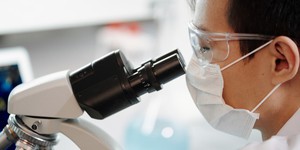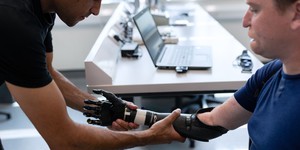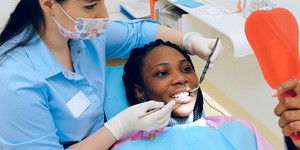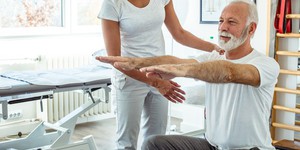Health Careers (43 results)
|
Select a resource
Filter by
Sort by
|
Career Profile
I have black hair, you have blonde hair. I have blue eyes, you have brown eyes. These, and other characteristics, describe what we look like, how tall we are, and even what our personality is, and they are all controlled by our chromosomes. Chromosomes are packages within each of our cells that hold our genes. Our chromosomes also determine if we might inherit any genetic diseases or if birth defects are present. Extracting, testing, and examining the chromosomes from cells is the job of the…
Read more
Career Profile
Shakespeare described humans as a "piece of work," and others have called the body "the most beautiful machine," but like any machine, sometimes body parts need repairs or servicing when the body cannot take care of the problems itself. That's where biomedical engineers come in. They use engineering to solve problems in medicine, such as creating replacement body parts, drug-delivery systems, medical instruments, and test equipment. Their work helps restore health and function, and improves the…
Read more
New
Career Profile
Pollution affects everything the eye can see (and even places your eyes cannot see, like deep underground and air particles). This is when environmental science and protection technicians, or an environmental advisor, come to the rescue! They help identify issues caused from pollution or contamination. They may collect samples and test them. They can even plan emergency responses and recommend improvements to make the world a better place for all!
Read more
Career Profile
Sports injuries can be painful and debilitating. Athletic trainers help athletes, and other physically active people, avoid such injuries, while also working to improve their strength and conditioning. Should a sports injury occur, athletic trainers help to evaluate the injury, determine the treatment needed, and design a fitness regime to rehabilitate the athlete so he or she is ready to go out and compete again.
Read more
Career Profile
Pharmacists are the medication experts. They advise doctors, nurses, and patients on the correct drug dosage for a patient's weight, age, health, and gender; on interactions between drugs; on side effects; on drug alternatives; on costs; and on ways to give drugs. They also dispense drugs at pharmacies, according to prescriptions, checking for dangerous drug interactions, and educating patients on how to take drugs, what reactions to watch out for, and how long it should take for drugs to work.
Read more
Career Profile
Good oral hygiene protects not only teeth and gums, but the whole body, reducing the risk of infections, heart disease, clogged arteries, and stroke. Dental hygienists help prevent and correct dental problems by taking X-rays, examining teeth and gums, removing plaque, polishing teeth, injecting local anesthetics, and assisting with dental procedures. They also play a key role in educating patients about how and when to brush and floss.
Read more
Career Profile
If you are injured in an accident, suffer a stroke, heart attack, or loss of a limb, or are born with conditions that make it difficult to move your body, then you will often be cared for by a physical therapist. Physical therapists review a patient's medical history, test and measure his or her physical condition (things like range of motion, strength, flexibility, balance, coordination, muscle function), and then develop a treatment plan to meet some physical goals. They coach, motivate, and…
Read more
Career Profile
Each time your heart beats, or you breathe, think, dream, smell, see, move, laugh, read, remember, write, or feel something, you are using your nervous system. The nervous system includes your brain, spinal cord, and a huge network of nerves that make electrical connections all over your body. Neurologists are the medical doctors who diagnose and treat problems with the nervous system. They work to restore health to an essential system in the body.
Read more
Career Profile
Do you like a good mystery? Well, an epidemiologist's job is all about solving mysteries—medical mysteries—but instead of figuring out "who done it" like a police detective would, they figure out "what caused it." They find relationships between a medical condition and things like human behavior, environmental toxins, genes, medical treatments, other diseases, and geographical location. For example, they ask questions like what causes multiple sclerosis? How can we prevent brain…
Read more
Career Profile
Pain is something that no one enjoys or wants to remember, especially during surgery. Certified registered nurse anesthetists, who share virtually identical responsibilities with anesthesiologist assistants, are key members of anesthesia healthcare teams. Working independently, or under the supervision of an anesthesiologist (a medical doctor), they prepare patients for anesthesia, administer anesthesia, monitor patients closely during surgery, and monitor patients' progress after surgery. They…
Read more
Career Profile
Ever wondered who plans the school lunch, food for patients at a hospital, or the meals for athletes at the Olympics? The answer is dietitians and nutritionists! A dietitian or nutritionist's job is to supervise the planning and preparation of meals to ensure that people—like students, patients, and athletes—are getting the right foods to make them as healthy and as strong as possible. Some dietitians and nutritionists also work to educate people about good food choices so they can…
Read more
|
Explore Our Science Videos
Two-Stage Balloon Rocket Introduction
Ball Launcher: 2018 Engineering Challenge
Build a Solar-Powered Car for the Junior Solar Sprint
















